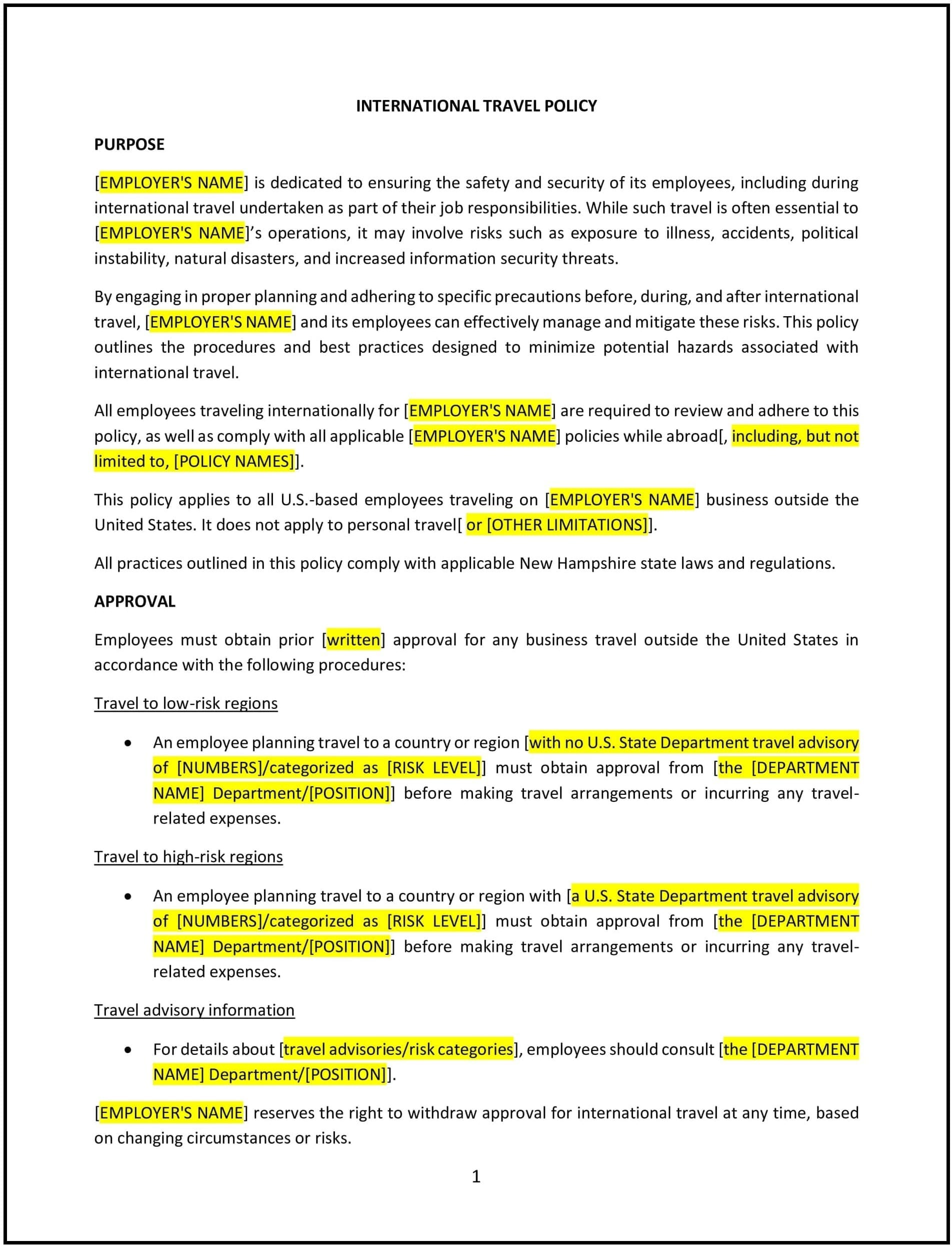International travel policy (New Hampshire): Free template
Got contracts to review? While you're here for policies, let Cobrief make contract review effortless—start your free review now.

Customize this template for free
International travel policy (New Hampshire)
An international travel policy helps New Hampshire businesses manage and oversee employee travel for business purposes outside the United States. This policy outlines the guidelines for travel approval, booking, expenses, safety protocols, and risk management to ensure a smooth and efficient international business trip experience.
By adopting this policy, businesses in New Hampshire can streamline travel procedures, ensure employee safety, and maintain control over travel expenses, while meeting both business needs and legal requirements for international operations.
How to use this international travel policy (New Hampshire)
- Define travel approval process: Clearly specify how employees should request and obtain approval for international travel, including the necessary documentation and timelines for submitting travel plans.
- Outline allowed travel expenses: Set guidelines on what travel-related expenses (flights, accommodation, meals, transportation) are eligible for reimbursement and any limits or per diem rates that apply.
- Provide travel booking guidelines: Indicate preferred travel providers or platforms for booking flights, accommodations, and transportation to ensure consistency and cost-effectiveness.
- Address safety and risk management: Establish protocols to protect employee safety during international travel, including travel insurance requirements, emergency contact information, and a clear procedure for handling emergencies abroad.
- Specify travel documentation requirements: Ensure that employees have the necessary documentation for international travel, such as valid passports, visas, and health certifications, and explain how these will be managed by the company.
- Provide guidance on cultural sensitivity: Offer guidelines to employees on respecting local customs, cultural practices, and international business etiquette to ensure a professional and respectful experience abroad.
- Set communication expectations: Specify how employees should stay in touch with the company during travel, including regular check-ins, emergency contacts, and reporting procedures if there are any issues during the trip.
- Review and update: Regularly review and update the policy to reflect changes in travel restrictions, regulations, or company requirements related to international travel.
Benefits of using this international travel policy (New Hampshire)
This policy provides several benefits for New Hampshire businesses:
- Ensures employee safety: The policy outlines steps to protect employees while traveling abroad, including safety protocols, emergency contacts, and insurance coverage, reducing risk and ensuring their well-being.
- Streamlines travel logistics: By setting clear guidelines for booking, expenses, and approvals, the policy helps simplify the planning process, saving time and avoiding confusion.
- Controls travel costs: The policy helps businesses manage travel expenses by setting limits and outlining eligible reimbursements, which helps prevent overspending.
- Improves consistency: Standardizing the international travel process ensures that employees follow the same procedures and guidelines, making travel planning more predictable and organized.
- Enhances corporate image: Employees representing the company abroad in a professional and culturally sensitive manner reflect positively on the business’s reputation and global operations.
Tips for using this international travel policy (New Hampshire)
- Communicate the policy clearly: Ensure all employees are familiar with the policy and understand how to request approval, track expenses, and adhere to safety procedures before traveling.
- Use centralized booking: To manage travel costs and ensure compliance with the policy, consider using a centralized system for booking travel arrangements and making travel reservations.
- Provide pre-travel briefings: Offer employees pre-travel briefings on safety protocols, local customs, and key logistical details to ensure they are well-prepared for international trips.
- Monitor and track expenses: Set up a system for tracking and approving travel expenses in real-time to ensure that reimbursements are accurate and within the policy guidelines.
- Be flexible for emergencies: In case of emergencies or unforeseen circumstances, have a process in place for accommodating last-minute changes to travel plans, such as rescheduling flights or accommodations.